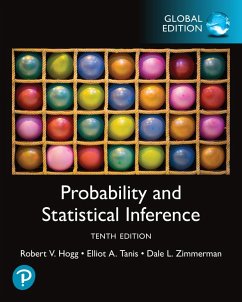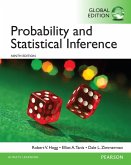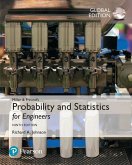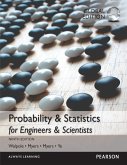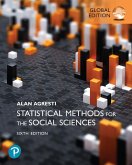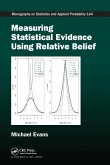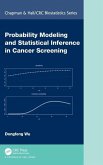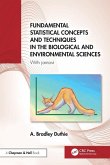74,99 €
inkl. MwSt.
Versandkostenfrei*
Nachauflage / -produktion in Vorbereitung.
Melden Sie sich
hier
hier
für den Produktalarm an, um über die Verfügbarkeit des Produkts informiert zu werden.
oder sofort lesen als eBook

37 °P sammeln
- Broschiertes Buch
For one- or two-semester courses in Probability, Probability & Statistics, or Mathematical Statistics. An authoritative introduction to an in-demand field Advances in computing technology particularly in science and business have increased the need for more statistical scientists to examine the huge amount of data being collected. Written by veteran statisticians, Probability and Statistical Inference, 10th Edition emphasizes the existence of variation in almost every process, and how the study of probability and statistics helps us understand this variation. This applied introduction to…mehr
Andere Kunden interessierten sich auch für
![Probability and Statistical Inference, Global Edition Probability and Statistical Inference, Global Edition]() Robert HoggProbability and Statistical Inference, Global Edition118,99 €
Robert HoggProbability and Statistical Inference, Global Edition118,99 €![Miller & Freund's Probability and Statistics for Engineers, Global Edition Miller & Freund's Probability and Statistics for Engineers, Global Edition]() Richard JohnsonMiller & Freund's Probability and Statistics for Engineers, Global Edition109,99 €
Richard JohnsonMiller & Freund's Probability and Statistics for Engineers, Global Edition109,99 €![Probability & Statistics for Engineers & Scientists, Global Edition Probability & Statistics for Engineers & Scientists, Global Edition]() Ronald WalpoleProbability & Statistics for Engineers & Scientists, Global Edition118,99 €
Ronald WalpoleProbability & Statistics for Engineers & Scientists, Global Edition118,99 €![Statistical Methods for the Social Sciences, Global Edition Statistical Methods for the Social Sciences, Global Edition]() Alan AgrestiStatistical Methods for the Social Sciences, Global Edition95,99 €
Alan AgrestiStatistical Methods for the Social Sciences, Global Edition95,99 €![Measuring Statistical Evidence Using Relative Belief Measuring Statistical Evidence Using Relative Belief]() Michael EvansMeasuring Statistical Evidence Using Relative Belief51,99 €
Michael EvansMeasuring Statistical Evidence Using Relative Belief51,99 €![Probability Modeling and Statistical Inference in Cancer Screening Probability Modeling and Statistical Inference in Cancer Screening]() Dongfeng WuProbability Modeling and Statistical Inference in Cancer Screening108,99 €
Dongfeng WuProbability Modeling and Statistical Inference in Cancer Screening108,99 €![Fundamental Statistical Concepts and Techniques in the Biological and Environmental Sciences Fundamental Statistical Concepts and Techniques in the Biological and Environmental Sciences]() A. Bradley Duthie (UK. University of Stirling)Fundamental Statistical Concepts and Techniques in the Biological and Environmental Sciences71,99 €
A. Bradley Duthie (UK. University of Stirling)Fundamental Statistical Concepts and Techniques in the Biological and Environmental Sciences71,99 €-
-
-
For one- or two-semester courses in Probability, Probability & Statistics, or Mathematical Statistics. An authoritative introduction to an in-demand field Advances in computing technology particularly in science and business have increased the need for more statistical scientists to examine the huge amount of data being collected. Written by veteran statisticians, Probability and Statistical Inference, 10th Edition emphasizes the existence of variation in almost every process, and how the study of probability and statistics helps us understand this variation. This applied introduction to probability and statistics reinforces basic mathematical concepts with numerous real-world examples and applications to illustrate the relevance of key concepts. It is designed for a two-semester course, but it can be adapted for a one-semester course. A good calculus background is needed, but no previous study of probability or statistics is required.
Hinweis: Dieser Artikel kann nur an eine deutsche Lieferadresse ausgeliefert werden.
Hinweis: Dieser Artikel kann nur an eine deutsche Lieferadresse ausgeliefert werden.
Produktdetails
- Produktdetails
- Verlag: Pearson Education Limited
- 10 ed
- Seitenzahl: 557
- Erscheinungstermin: 12. März 2024
- Englisch
- Abmessung: 256mm x 204mm x 30mm
- Gewicht: 1008g
- ISBN-13: 9781292454764
- ISBN-10: 1292454768
- Artikelnr.: 67861177
- Herstellerkennzeichnung
- Pearson
- St.-Martin-Straße 82
- 81541 München
- salesde@pearson.com
- +4989541960460
- Verlag: Pearson Education Limited
- 10 ed
- Seitenzahl: 557
- Erscheinungstermin: 12. März 2024
- Englisch
- Abmessung: 256mm x 204mm x 30mm
- Gewicht: 1008g
- ISBN-13: 9781292454764
- ISBN-10: 1292454768
- Artikelnr.: 67861177
- Herstellerkennzeichnung
- Pearson
- St.-Martin-Straße 82
- 81541 München
- salesde@pearson.com
- +4989541960460
About our authors Robert V. Hogg was Professor Emeritus of Statistics at the University of Iowa since 2001. He got his B.A. in mathematics at the University of Illinois and M.S. and Ph.D. degrees in mathematics, specializing in actuarial sciences and statistics, from the University of Iowa. Known for his gift of humor and his passion for teaching, Hogg had far-reaching influence in the field of statistics. Throughout his career, he played a major role in defining statistics as a unique academic field, and almost literally "wrote the book" on the subject. He authored more than 70 research articles and co-authored 4 books, including Introduction of Mathematical Statistics, 6th Edition with J. W. McKean and A.T. Craig; Applied Statistics for Engineers and Physical Scientists, 3rd Edition with J. Ledolter; and A Brief Course in Mathematical Statistics, 1st Edition with E.A. Tanis. His texts have become classroom standards used by hundreds of thousands of students. Among the many awards he received for distinction in teaching, Hogg was honored at the national level (the Mathematical Association of America Award for Distinguished Teaching), the state level (the Governor's Science Medal for Teaching), and the university level (Collegiate Teaching Award). His important contributions to statistical research have been acknowledged by his election to fellowship standing in the ASA and the Institute of Mathematical Statistics. Elliot Tanis, Professor Emeritus of Mathematics at Hope College, received his M.S. and Ph.D. degrees from the University of Iowa. Tanis is the co-author of A Brief Course in Mathematical Statistics with R. Hogg and Probability and Statistics: Explorations with MAPLE, 2nd Edition with Z. Karian. He has authored over 30 publications on statistics and is a past chairman and governor of the Michigan MAA, which presented him with both its Distinguished Teaching and Distinguished Service Awards. He taught at Hope for 35 years and in 1989 received the HOPE Award (Hope's Outstanding Professor Educator) for his excellence in teaching. In addition to his academic interests, Dr. Tanis is also an avid tennis player and devoted Hope sports fan. Dale Zimmerman is the Robert V. Hogg Professor in the Department of Statistics and Actuarial Science at the University of Iowa.
1. Probability
* 1.1 Properties of Probability
* 1.2 Methods of Enumeration
* 1.3 Conditional Probability
* 1.4 Independent Events
* 1.5 Bayes' Theorem
2. Discrete Distributions
* 2.1 Random Variables of the Discrete Type
* 2.2 Mathematical Expectation
* 2.3 Special Mathematical Expectations
* 2.4 The Binomial Distribution
* 2.5 The Hypergeometric Distribution
* 2.6 The Negative Binomial Distribution
* 2.7 The Poisson Distribution
3. Continuous Distributions
* 3.1 Random Variables of the Continuous Type
* 3.2 The Exponential, Gamma, and Chi-Square Distributions
* 3.3 The Normal Distribution
* 3.4 Additional Models
4. Bivariate Distributions
* 4.1 Bivariate Distributions of the Discrete Type
* 4.2 The Correlation Coefficient
* 4.3 Conditional Distributions
* 4.4 Bivariate Distributions of the Continuous Type
* 4.5 The Bivariate Normal Distribution
5. Distributions of Functions of Random Variables
* 5.1 Functions of One Random Variable
* 5.2 Transformations of Two Random Variables
* 5.3 Several Independent Random Variables
* 5.4 The Moment-Generating Function Technique
* 5.5 Random Functions Associated with Normal Distributions
* 5.6 The Central Limit Theorem
* 5.7 Approximations for Discrete Distributions
* 5.8 Chebyshev's Inequality and Convergence in Probability
* 5.9 Limiting Moment-Generating Functions
6. Point Estimation
* 6.1 Descriptive Statistics
* 6.2 Exploratory Data Analysis
* 6.3 Order Statistics
* 6.4 Maximum Likelihood and Method of Moments Estimation
* 6.5 A Simple Regression Problem
* 6.6 Asymptotic Distributions of Maximum Likelihood Estimators
* 6.7 Sufficient Statistics
* 6.8 Bayesian Estimation
7. Interval Estimation
* 7.1 Confidence Intervals for Means
* 7.2 Confidence Intervals for the Difference of Two Means
* 7.3 Confidence Intervals for Proportions
* 7.4 Sample Size
* 7.5 Distribution-Free Confidence Intervals for Percentiles
* 7.6 More Regression
* 7.7 Resampling Methods
8. Tests of Statistical Hypotheses
* 8.1 Tests About One Mean
* 8.2 Tests of the Equality of Two Means
* 8.3 Tests for Variances
* 8.4 Tests About Proportions
* 8.5 Some Distribution-Free Tests
* 8.6 Power of a Statistical Test
* 8.7 Best Critical Regions
* 8.8 Likelihood Ratio Tests
9. More Tests
* 9.1 Chi-Square Goodness-of-Fit Tests
* 9.2 Contingency Tables
* 9.3 One-Factor Analysis of Variance
* 9.4 Two-Way Analysis of Variance
* 9.5 General Factorial and 2k Factorial Designs
* 9.6 Tests Concerning Regression and Correlation
* 9.7 Statistical Quality Control
APPENDICES A. References B. Tables C. Answers to Odd-Numbered Exercises D.
Review of Selected Mathematical Techniques
* D.1 Algebra of Sets
* D.2 Mathematical Tools for the Hypergeometric Distribution
* D.3 Limits
* D.4 Infinite Series
* D.5 Integration
* D.6 Multivariate Calculus
Index
* 1.1 Properties of Probability
* 1.2 Methods of Enumeration
* 1.3 Conditional Probability
* 1.4 Independent Events
* 1.5 Bayes' Theorem
2. Discrete Distributions
* 2.1 Random Variables of the Discrete Type
* 2.2 Mathematical Expectation
* 2.3 Special Mathematical Expectations
* 2.4 The Binomial Distribution
* 2.5 The Hypergeometric Distribution
* 2.6 The Negative Binomial Distribution
* 2.7 The Poisson Distribution
3. Continuous Distributions
* 3.1 Random Variables of the Continuous Type
* 3.2 The Exponential, Gamma, and Chi-Square Distributions
* 3.3 The Normal Distribution
* 3.4 Additional Models
4. Bivariate Distributions
* 4.1 Bivariate Distributions of the Discrete Type
* 4.2 The Correlation Coefficient
* 4.3 Conditional Distributions
* 4.4 Bivariate Distributions of the Continuous Type
* 4.5 The Bivariate Normal Distribution
5. Distributions of Functions of Random Variables
* 5.1 Functions of One Random Variable
* 5.2 Transformations of Two Random Variables
* 5.3 Several Independent Random Variables
* 5.4 The Moment-Generating Function Technique
* 5.5 Random Functions Associated with Normal Distributions
* 5.6 The Central Limit Theorem
* 5.7 Approximations for Discrete Distributions
* 5.8 Chebyshev's Inequality and Convergence in Probability
* 5.9 Limiting Moment-Generating Functions
6. Point Estimation
* 6.1 Descriptive Statistics
* 6.2 Exploratory Data Analysis
* 6.3 Order Statistics
* 6.4 Maximum Likelihood and Method of Moments Estimation
* 6.5 A Simple Regression Problem
* 6.6 Asymptotic Distributions of Maximum Likelihood Estimators
* 6.7 Sufficient Statistics
* 6.8 Bayesian Estimation
7. Interval Estimation
* 7.1 Confidence Intervals for Means
* 7.2 Confidence Intervals for the Difference of Two Means
* 7.3 Confidence Intervals for Proportions
* 7.4 Sample Size
* 7.5 Distribution-Free Confidence Intervals for Percentiles
* 7.6 More Regression
* 7.7 Resampling Methods
8. Tests of Statistical Hypotheses
* 8.1 Tests About One Mean
* 8.2 Tests of the Equality of Two Means
* 8.3 Tests for Variances
* 8.4 Tests About Proportions
* 8.5 Some Distribution-Free Tests
* 8.6 Power of a Statistical Test
* 8.7 Best Critical Regions
* 8.8 Likelihood Ratio Tests
9. More Tests
* 9.1 Chi-Square Goodness-of-Fit Tests
* 9.2 Contingency Tables
* 9.3 One-Factor Analysis of Variance
* 9.4 Two-Way Analysis of Variance
* 9.5 General Factorial and 2k Factorial Designs
* 9.6 Tests Concerning Regression and Correlation
* 9.7 Statistical Quality Control
APPENDICES A. References B. Tables C. Answers to Odd-Numbered Exercises D.
Review of Selected Mathematical Techniques
* D.1 Algebra of Sets
* D.2 Mathematical Tools for the Hypergeometric Distribution
* D.3 Limits
* D.4 Infinite Series
* D.5 Integration
* D.6 Multivariate Calculus
Index
1. Probability
* 1.1 Properties of Probability
* 1.2 Methods of Enumeration
* 1.3 Conditional Probability
* 1.4 Independent Events
* 1.5 Bayes' Theorem
2. Discrete Distributions
* 2.1 Random Variables of the Discrete Type
* 2.2 Mathematical Expectation
* 2.3 Special Mathematical Expectations
* 2.4 The Binomial Distribution
* 2.5 The Hypergeometric Distribution
* 2.6 The Negative Binomial Distribution
* 2.7 The Poisson Distribution
3. Continuous Distributions
* 3.1 Random Variables of the Continuous Type
* 3.2 The Exponential, Gamma, and Chi-Square Distributions
* 3.3 The Normal Distribution
* 3.4 Additional Models
4. Bivariate Distributions
* 4.1 Bivariate Distributions of the Discrete Type
* 4.2 The Correlation Coefficient
* 4.3 Conditional Distributions
* 4.4 Bivariate Distributions of the Continuous Type
* 4.5 The Bivariate Normal Distribution
5. Distributions of Functions of Random Variables
* 5.1 Functions of One Random Variable
* 5.2 Transformations of Two Random Variables
* 5.3 Several Independent Random Variables
* 5.4 The Moment-Generating Function Technique
* 5.5 Random Functions Associated with Normal Distributions
* 5.6 The Central Limit Theorem
* 5.7 Approximations for Discrete Distributions
* 5.8 Chebyshev's Inequality and Convergence in Probability
* 5.9 Limiting Moment-Generating Functions
6. Point Estimation
* 6.1 Descriptive Statistics
* 6.2 Exploratory Data Analysis
* 6.3 Order Statistics
* 6.4 Maximum Likelihood and Method of Moments Estimation
* 6.5 A Simple Regression Problem
* 6.6 Asymptotic Distributions of Maximum Likelihood Estimators
* 6.7 Sufficient Statistics
* 6.8 Bayesian Estimation
7. Interval Estimation
* 7.1 Confidence Intervals for Means
* 7.2 Confidence Intervals for the Difference of Two Means
* 7.3 Confidence Intervals for Proportions
* 7.4 Sample Size
* 7.5 Distribution-Free Confidence Intervals for Percentiles
* 7.6 More Regression
* 7.7 Resampling Methods
8. Tests of Statistical Hypotheses
* 8.1 Tests About One Mean
* 8.2 Tests of the Equality of Two Means
* 8.3 Tests for Variances
* 8.4 Tests About Proportions
* 8.5 Some Distribution-Free Tests
* 8.6 Power of a Statistical Test
* 8.7 Best Critical Regions
* 8.8 Likelihood Ratio Tests
9. More Tests
* 9.1 Chi-Square Goodness-of-Fit Tests
* 9.2 Contingency Tables
* 9.3 One-Factor Analysis of Variance
* 9.4 Two-Way Analysis of Variance
* 9.5 General Factorial and 2k Factorial Designs
* 9.6 Tests Concerning Regression and Correlation
* 9.7 Statistical Quality Control
APPENDICES A. References B. Tables C. Answers to Odd-Numbered Exercises D.
Review of Selected Mathematical Techniques
* D.1 Algebra of Sets
* D.2 Mathematical Tools for the Hypergeometric Distribution
* D.3 Limits
* D.4 Infinite Series
* D.5 Integration
* D.6 Multivariate Calculus
Index
* 1.1 Properties of Probability
* 1.2 Methods of Enumeration
* 1.3 Conditional Probability
* 1.4 Independent Events
* 1.5 Bayes' Theorem
2. Discrete Distributions
* 2.1 Random Variables of the Discrete Type
* 2.2 Mathematical Expectation
* 2.3 Special Mathematical Expectations
* 2.4 The Binomial Distribution
* 2.5 The Hypergeometric Distribution
* 2.6 The Negative Binomial Distribution
* 2.7 The Poisson Distribution
3. Continuous Distributions
* 3.1 Random Variables of the Continuous Type
* 3.2 The Exponential, Gamma, and Chi-Square Distributions
* 3.3 The Normal Distribution
* 3.4 Additional Models
4. Bivariate Distributions
* 4.1 Bivariate Distributions of the Discrete Type
* 4.2 The Correlation Coefficient
* 4.3 Conditional Distributions
* 4.4 Bivariate Distributions of the Continuous Type
* 4.5 The Bivariate Normal Distribution
5. Distributions of Functions of Random Variables
* 5.1 Functions of One Random Variable
* 5.2 Transformations of Two Random Variables
* 5.3 Several Independent Random Variables
* 5.4 The Moment-Generating Function Technique
* 5.5 Random Functions Associated with Normal Distributions
* 5.6 The Central Limit Theorem
* 5.7 Approximations for Discrete Distributions
* 5.8 Chebyshev's Inequality and Convergence in Probability
* 5.9 Limiting Moment-Generating Functions
6. Point Estimation
* 6.1 Descriptive Statistics
* 6.2 Exploratory Data Analysis
* 6.3 Order Statistics
* 6.4 Maximum Likelihood and Method of Moments Estimation
* 6.5 A Simple Regression Problem
* 6.6 Asymptotic Distributions of Maximum Likelihood Estimators
* 6.7 Sufficient Statistics
* 6.8 Bayesian Estimation
7. Interval Estimation
* 7.1 Confidence Intervals for Means
* 7.2 Confidence Intervals for the Difference of Two Means
* 7.3 Confidence Intervals for Proportions
* 7.4 Sample Size
* 7.5 Distribution-Free Confidence Intervals for Percentiles
* 7.6 More Regression
* 7.7 Resampling Methods
8. Tests of Statistical Hypotheses
* 8.1 Tests About One Mean
* 8.2 Tests of the Equality of Two Means
* 8.3 Tests for Variances
* 8.4 Tests About Proportions
* 8.5 Some Distribution-Free Tests
* 8.6 Power of a Statistical Test
* 8.7 Best Critical Regions
* 8.8 Likelihood Ratio Tests
9. More Tests
* 9.1 Chi-Square Goodness-of-Fit Tests
* 9.2 Contingency Tables
* 9.3 One-Factor Analysis of Variance
* 9.4 Two-Way Analysis of Variance
* 9.5 General Factorial and 2k Factorial Designs
* 9.6 Tests Concerning Regression and Correlation
* 9.7 Statistical Quality Control
APPENDICES A. References B. Tables C. Answers to Odd-Numbered Exercises D.
Review of Selected Mathematical Techniques
* D.1 Algebra of Sets
* D.2 Mathematical Tools for the Hypergeometric Distribution
* D.3 Limits
* D.4 Infinite Series
* D.5 Integration
* D.6 Multivariate Calculus
Index
